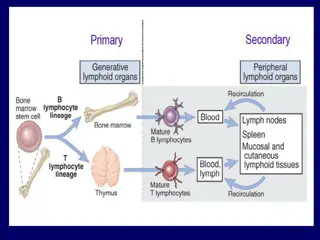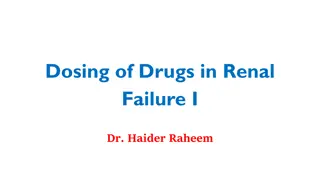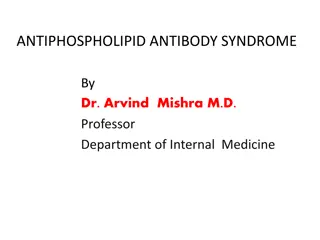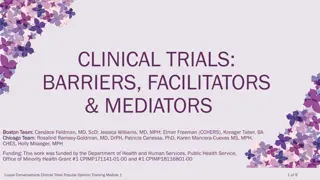Antibodies in Vaccines: Risks and Case Studies
Explore the impact of antibodies in vaccines and their link to autoimmune diseases through case studies. Uncover the safety signals related to various antibodies and their potential risks in COVID vaccine recipients. Discover how antibodies like Beta-2 Glycoprotein, Antiplatelet, and DNA can lead to
0 views • 9 slides
Northwestern University Scientists Discover Potential Lupus Cure
Northwestern researchers pinpointed the specific cells responsible for triggering lupus cure and developed strategies to directly target these cells, potentially reversing the disease
0 views • 2 slides
Understanding Anticoagulants Used in Hematology Laboratory
Anticoagulants play a crucial role in hematology by preventing blood clotting, allowing separation of blood components, with EDTA being the most commonly used anticoagulant. Proper blood-to-anticoagulant ratio is essential to avoid inaccuracies in results, such as falsely reduced hematocrit or erron
0 views • 10 slides
Immune Response Regulation and Autoimmunity Overview
The immune system maintains a balance through tolerance mechanisms to prevent autoimmunity. Central and peripheral tolerance play crucial roles in immune unresponsiveness to self-antigens. Failure in immune regulation can lead to autoimmune diseases like diabetes and lupus. Vaccination, discovered b
0 views • 18 slides
Advances in Anticoagulation Therapy for Cancer-Related VTE and Stroke
Recent studies have shown advancements in anticoagulation therapy for cancer patients with venous thromboembolism (VTE) and stroke prevention. Direct oral anticoagulants (DOACs) are now considered beneficial for treating VTE in cancer, offering advantages in administration and efficacy. Different an
3 views • 9 slides
Oral Manifestations of Systemic Diseases in Dentistry
This content explores various systemic diseases and their oral manifestations relevant to dentistry. It covers associations between heart disease and periodontal disease, effects of chronic corticosteroid use on the pulmonary system, endocrine disorders like diabetes and thyroid issues, autoimmune d
1 views • 63 slides
Schedule of Ratings for Skin Conditions in CFR 38.4.118
This document outlines the Schedule of Ratings for various skin conditions, including burn scars, dermatitis, leishmaniasis, lupus, tuberculosis luposa, dermatophytosis, bullous disorders, skin neoplasms, infections, collagen-vascular diseases, and more. It provides detailed descriptions and classif
0 views • 16 slides
Skin Manifestations of Connective Tissue Diseases - Lecture Highlights
This lecture series discusses the various skin manifestations of connective tissue diseases, focusing on Lupus Erythematosus and other related conditions. It covers different types of Lupus, its effects on the body systems, treatment options, and psychosocial impacts. Additionally, the presentation
0 views • 76 slides
Understanding Tuberculosis of the Skin: Clinical Aspects, Diagnosis, and Treatment
This comprehensive guide explores the different types of tuberculosis affecting the skin, including localized and generalized forms, as well as tuberculide. It covers clinical features, diagnostic methods like the tuberculin test, and treatment recommendations for conditions such as lupus vulgaris.
1 views • 29 slides
Ceftazidime Dosage Modification in Renal Failure Cases
Ceftazidime dosage adjustments are crucial in patients with renal impairment to prevent toxicity or suboptimal treatment. Factors like renal function, drug elimination route, and therapeutic window must be considered. Proper dosing ensures effective treatment while avoiding adverse effects in patien
0 views • 33 slides
Understanding Antiphospholipid Antibody Syndrome and Its Clinical Implications
Antiphospholipid antibody syndrome is an acquired disorder characterized by recurrent thrombosis or pregnancy complications due to autoantibodies against phospholipid-binding plasma proteins. Learn about its classification, epidemiology, pathogenesis, and diagnostic antibodies. Discover how lupus an
0 views • 35 slides
Clinical Trials: Barriers and Facilitators in Enrollment Process
Explore the barriers, facilitators, and mediators in clinical trials enrollment process, along with examples and definitions discussed during Lupus Conversations focus groups. Understand how family support, healthcare provider relationships, and patient motivation play key roles in easing the enroll
0 views • 9 slides
Quality Improvement Initiatives for Reducing Anticoagulant-Related Harm: A Review
The review focuses on reducing harm associated with anticoagulant use through quality improvement initiatives. It discusses under- and over-utilization, inappropriate prescribing, and suboptimal management of adverse drug events. The project aims to identify literature, guidance, and improvement ini
0 views • 27 slides
Understanding Anticoagulants: Mechanisms, Indications, and Limitations
Anticoagulants play a crucial role in preventing blood clotting and are used in various medical conditions such as myocardial infarction and deep venous thrombosis. They include heparin, warfarin, and antiplatelet agents like aspirin. This article explores the mechanisms of action, indications, and
0 views • 29 slides
Clinical Chemistry Specimen Collection and Processing Overview
Clinical chemistry specimen collection involves obtaining blood samples for analysis. Serum and plasma are commonly used specimens, each requiring specific handling. Different anticoagulants like heparin are used to prevent blood clotting during sample processing. Heparin, a widely used anticoagulan
0 views • 15 slides
Interesting Case Conference - Brian C. Radlinski, MD (January 27, 2015)
A detailed case conference discussing the clinical history, prior treatments, blood bank reports, and a delayed hemolytic transfusion reaction in a 43-year-old Caucasian female with systemic lupus erythematosus, end-stage renal disease, and multiple medical interventions. The presentation highlights
0 views • 12 slides
Got a Lemon- Turn Your Underperforming Drug Into a Bestseller
We turned an underperforming anticoagulant drug into a market leader with a strategic brand repositioning approach! Within six months, the drug saw a 25% revenue increase and a 30% boost in brand recognition.
2 views • 8 slides
Capitalization Rules for Races, Nationalities, and Species
Learn how to properly capitalize races, nationalities, and species in your writing. Always capitalize races such as Chinese, Indian, and Hispanic. Capitalize nationalities and nation-related words like French, Swiss, and Spanish. When writing species names, capitalize the first part of the scientifi
0 views • 5 slides

















